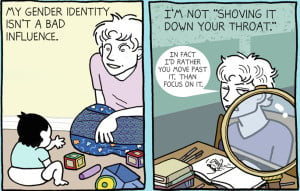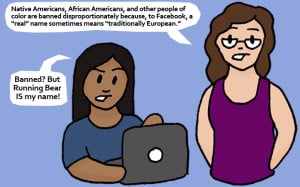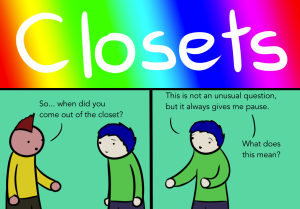Lindsey: This is my dear friend Acton. Acton, would you like to introduce yourself to YouTube?
Acton: Hi. I’m Acton. I’m Lindsey Doe’s friend. I am an out trans guy. And … Yeah.
Lindsey: Do you want to define transgender?
Acton: No (laughs). No. When people usually ask me that, “What does transgender mean?” It’s essentially my experience of being born a woman and feeling really misplaced and feeling very, very, very, I don’t want to say hopeless, but just really at odds with a lot of parts of my life. Personally uncomfortable, physically uncomfortable, and then sort of just deciding that I was going to make a change because I didn’t want to feel that way anymore. It was a huge focal point.
Then, I had this job and my roommate was like, “So you’re going to tell them that you’re taking testosterone, right?” and I was like “Yeah, I guess so.” Because my roommate at the time was like “They’re going to ask you why you have a cold all the time,” and why you’re going through puberty and why you have facial hair …
To that concept, I’d just like to say that estrogen and testosterone are amazing things. You start taking testosterone, you start growing hair in uncomfortable places. Twelve year old boy ‘stache.
Lindsey: You’re rocking an awesome beard.
Acton: Thank you. Thank you very much. My mom had a really, really hard time with it. When I got done telling her, she was like “I’m not going to talk to you for a little while,” and I was like “Well do you want me to call you like …” and she was like “No, no, no, I don’t want you to call me. I’ll call you. I just need not to talk to you right now,” and she didn’t talk to me for a long time. We’re not talking about a year, but it was a good chunk of time where I was like “Oh god. My mom’s never going to talk to me again,” and then my dad was kind of like “Well what the hell?”
It occurs to me later on that both my parents were not so much mad at me about transitioning and wanting to live my life the way that I have chosen, they’re so consumed by what they had done wrong.
Lindsey: It’s not about you, but other people!
Acton: (laughs) I mean there’s that, and they literally were just like, “How do we fix this?” It took it a few conversations talking about like, this isn’t something that you fix, you cannot fix this. So, those are good conversations. At least they talk to me now. It’s totally fine. I love those guys a lot.
Lindsey: That’s great.
Acton: My boss is this big white dude. Used to be an ex-cop. He’s sitting at his desk. I march right up there, and I’m thinking okay, just prepare for the worst. Just prepare to lose this job, because that’s going to be okay. I’m standing there, and I just sort of verbally spew all over his desk about how I’m trans and I want to live my life as a dude. I would like it if he called me by this name and he used male pronouns, and my boss just sort of looks up at me and he’s just horrified.
He is like horrified, and I’m like “Here it comes” and he says “What?” and I’m like “What?” and he says “No, really. What? I totally did not just hear what you said. What?” So I take a deep breath, and have to repeat myself and he’s still looking at me, horrified, like his mind is just being blown or something like that and I’m like “Oh my god this dude is going to pick me up and throw me out the door. I just know it.”
All he says is “Are you happy?” and I was like, “Well yeah” and he was like “That’s all I need to know.” He never once messed up my pronoun and he never once messed up my name.
I know that story is not a common story. I don’t think people experience a lot of that, but I was really thankful.
Lindsey: You’ve done an amazing thing for yourself, and I’m glad that you’re sharing it with us.
Acton: Thank you very much.
Lindsey: You’re welcome. Thanks for joining me and Acton for Trans Awareness Week. I hope you understand that this process goes beyond this one, solitary week, and that you continue to stay curious.




















